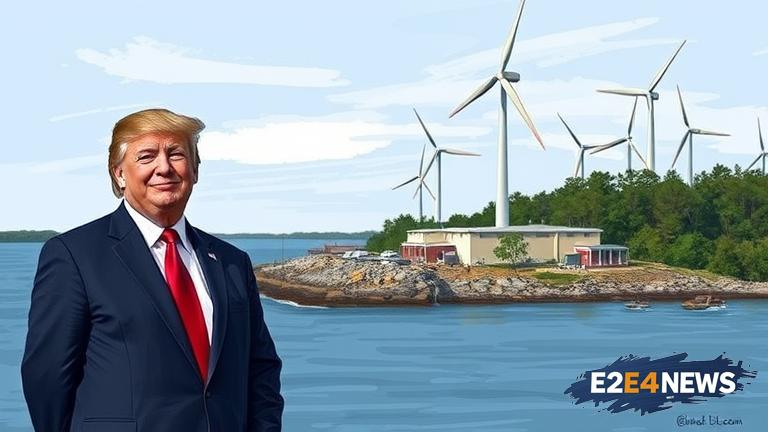The Trump administration has made a significant decision to halt the construction of a wind farm off the coast of Rhode Island, sparking controversy and debate among environmentalists and industry stakeholders. The project, which was initially approved by the Obama administration, aimed to install hundreds of wind turbines in the Atlantic Ocean to generate clean energy. However, the Trump administration has cited concerns over the potential impact on marine life, including endangered species such as the North Atlantic right whale. The decision has been met with criticism from environmental groups, who argue that the project would have helped to reduce the country’s reliance on fossil fuels and mitigate climate change. On the other hand, some industry stakeholders have expressed relief, citing concerns over the potential disruption to commercial fishing operations and the impact on local economies. The project’s developer, Vineyard Wind, has expressed disappointment over the decision, stating that it would have created hundreds of jobs and generated significant economic benefits for the region. The company has also argued that the project would have helped to reduce greenhouse gas emissions and contribute to the country’s transition to a low-carbon economy. The Trump administration’s decision has been seen as a setback for the offshore wind industry, which has been growing rapidly in recent years. The industry has been touted as a key component of the country’s clean energy strategy, with the potential to generate significant amounts of electricity and create jobs. However, the decision has also highlighted the need for careful planning and consideration of environmental impacts when developing large-scale energy projects. The Rhode Island wind project was initially proposed in 2017, with the aim of installing 84 wind turbines in the Atlantic Ocean. The project was expected to generate enough electricity to power over 400,000 homes and reduce carbon emissions by millions of tons. However, the project has been plagued by delays and controversy, with some local residents expressing concerns over the potential impact on tourism and property values. The Trump administration’s decision has been seen as a victory for these groups, who have argued that the project would have had significant negative impacts on the local environment and economy. Despite the setback, the offshore wind industry is expected to continue growing, with several other projects in development along the East Coast. The industry has been driven by advances in technology and declining costs, making it more competitive with traditional fossil fuels. However, the Trump administration’s decision highlights the need for careful consideration of environmental impacts and community concerns when developing large-scale energy projects. The decision has also sparked debate over the role of government in regulating the energy industry and balancing competing interests. As the country continues to transition to a low-carbon economy, the offshore wind industry is likely to play a significant role, but it must do so in a way that balances economic, environmental, and social concerns. The Trump administration’s decision has been seen as a significant setback for the industry, but it also highlights the need for careful planning and consideration of environmental impacts. The project’s developer, Vineyard Wind, has stated that it will continue to work with regulators and stakeholders to address concerns and move the project forward. The company has also argued that the project would have created significant economic benefits for the region, including jobs and investment in local infrastructure. The decision has been met with criticism from some lawmakers, who have argued that it would have helped to reduce the country’s reliance on fossil fuels and mitigate climate change. The offshore wind industry has been growing rapidly in recent years, with several projects in development along the East Coast. The industry has been driven by advances in technology and declining costs, making it more competitive with traditional fossil fuels. However, the Trump administration’s decision highlights the need for careful consideration of environmental impacts and community concerns when developing large-scale energy projects.
